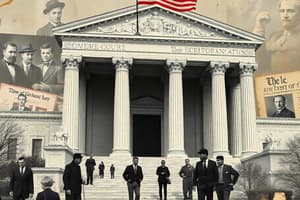Podcast
Questions and Answers
What was the primary reason for the Supreme Court convicting Schenk?
What was the primary reason for the Supreme Court convicting Schenk?
- He violated privacy laws.
- He attempted to overthrow the government.
- He was found guilty of theft.
- He created a clear and present danger. (correct)
What did the Supreme Court rule in the Tinker case regarding students' rights?
What did the Supreme Court rule in the Tinker case regarding students' rights?
- Students do not have any First Amendment rights in school.
- Schools can impose any restrictions on student expression.
- Students can only express themselves in designated areas.
- Students have First Amendment rights while attending school. (correct)
Which right was at the center of Gideon v. Wainwright?
Which right was at the center of Gideon v. Wainwright?
- Right to bear arms.
- Right to assemble peacefully.
- Right to free speech.
- Right to counsel. (correct)
What was the impact of the Supreme Court's decision in Gideon v. Wainwright?
What was the impact of the Supreme Court's decision in Gideon v. Wainwright?
What action did McDonald take against the City of Chicago?
What action did McDonald take against the City of Chicago?
What legal concept did the Supreme Court utilize to assess free speech in Schenk's case?
What legal concept did the Supreme Court utilize to assess free speech in Schenk's case?
Why was McDonald denied the right to own a handgun?
Why was McDonald denied the right to own a handgun?
What does the ruling in Tinker v. Des Moines emphasize about student activism?
What does the ruling in Tinker v. Des Moines emphasize about student activism?
What was the main issue in Engel vs Vitale?
What was the main issue in Engel vs Vitale?
How did the Supreme Court rule in Engel vs Vitale?
How did the Supreme Court rule in Engel vs Vitale?
What was the basis of Yoder's lawsuit against the state of Wisconsin?
What was the basis of Yoder's lawsuit against the state of Wisconsin?
What was the outcome of Wisconsin vs Yoder?
What was the outcome of Wisconsin vs Yoder?
What action did Charles Schenk take that led to his arrest?
What action did Charles Schenk take that led to his arrest?
What was Schenk charged with that reflected his actions?
What was Schenk charged with that reflected his actions?
Which constitutional clause was primarily involved in Engel vs Vitale?
Which constitutional clause was primarily involved in Engel vs Vitale?
What religious group was specifically mentioned in Wisconsin vs Yoder?
What religious group was specifically mentioned in Wisconsin vs Yoder?
Flashcards
Establishment Clause
Establishment Clause
The "Establishment Clause" prevents the government from establishing, endorsing, or promoting any specific religion.
Engel v. Vitale (1962)
Engel v. Vitale (1962)
A landmark case where the Supreme Court ruled that a New York law requiring public schools to hold a non-denominational prayer before school was unconstitutional.
Free Exercise Clause
Free Exercise Clause
The "Free Exercise Clause" protects the right of individuals to practice their religion without government interference.
Wisconsin v. Yoder (1972)
Wisconsin v. Yoder (1972)
Signup and view all the flashcards
Free Speech Clause
Free Speech Clause
Signup and view all the flashcards
Schenck v. United States (1919)
Schenck v. United States (1919)
Signup and view all the flashcards
Religious Freedom
Religious Freedom
Signup and view all the flashcards
Constitutional Challenge
Constitutional Challenge
Signup and view all the flashcards
Clear and Present Danger
Clear and Present Danger
Signup and view all the flashcards
Tinker v. Des Moines
Tinker v. Des Moines
Signup and view all the flashcards
Gideon v. Wainwright
Gideon v. Wainwright
Signup and view all the flashcards
Restriction on Free Speech
Restriction on Free Speech
Signup and view all the flashcards
Right to Bear Arms/Operative Clause
Right to Bear Arms/Operative Clause
Signup and view all the flashcards
McDonald v. City of Chicago
McDonald v. City of Chicago
Signup and view all the flashcards
Study Notes
Engel v. Vitale (1962)
- New York state required schools to say a non-denominational prayer.
- A parent sued, arguing this violated the Establishment Clause, which prohibits government endorsement of religion.
- The Supreme Court agreed, finding that the prayer established a religion.
- New York was forced to stop the prayer.
Wisconsin v. Yoder (1972)
- Wisconsin law required children to attend school until age 16.
- Amish parents wanted to pull their children out of school after 8th grade, citing religious reasons.
- The Supreme Court sided with the Amish, ruling that the state law violated the Free Exercise Clause of the First Amendment.
- Amish children could leave school after 8th grade.
Schenck v. United States (1919)
- Charles Schenck, a socialist, distributed pamphlets encouraging draft dodging during WWI.
- The Supreme Court found that speech that presents a clear and present danger to public safety is not protected by the Free Speech Clause.
Tinker v. Des Moines (1969)
- Students wore black armbands to protest the Vietnam War.
- They were suspended for violating school rules.
- The Supreme Court ruled in favor of the students, finding their actions protected by the First Amendment's Free Speech Clause.
- Students could express their views in school.
Gideon v. Wainwright (1963)
- Clarence Gideon was accused of a crime and couldn't afford a lawyer.
- He was denied legal representation by the court.
- The Supreme Court ruled that the Sixth Amendment's right to counsel applies to state criminal trials, even if the defendant cannot afford an attorney.
- Gideon received legal representation.
McDonald v. City of Chicago (2010)
- Chicago banned handgun registrations.
- Otis McDonald wanted to own a handgun, but Chicago denied his request.
- The Supreme Court determined the Second Amendment's right to bear arms applies to state and local governments.
- Individuals have the right to own firearms in any state.
Studying That Suits You
Use AI to generate personalized quizzes and flashcards to suit your learning preferences.




